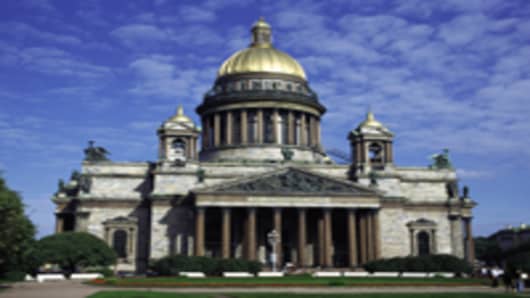The Russian Central Bank was never going to have an easy time establishing credibility with financial markets, not after a bout of hyperinflation and a subsequent debt default in the late 1990s.
But has the central bank taken its reputational rehabilitation too seriously? Russia’s relative economic stability since those dark days has won the central bank kudos from international investors. Domestic bankers, however, say the central bank needs to ease up on its fight against inflation.
“The central bank, unfortunately, has raised interest rates, which will have an effect on the price of lending,” Andrey Kostin, President of VTB Bank, told CNBC on Tuesday. VTB expects gross domestic product growth to decelerate to an annual rate of 3.5 percent next year, from just under five percent through much of 2012.
The central bank lifted its key policy rate by 25 basis points in September, and the bank’s First Deputy Chairman Alexei Ulyukayev has hinted of further tightening. The current interest rate “corridor” may be “too wide” he told a Russian television interviewer on Tuesday. The next monetary policy decision is due on Friday.
Such vigilance bucks the international trend toward lower rates, with most of the developed world growing sluggishly, or not at all. “Raising policy rates in a slowing, if still robust economy is very hard to justify,” said analysts at Moscow-based investment bank Renaissance Capital in a note issued Monday. “The [central bank] may jeopardise its policy credibility if it continues down the road of hiking rates.”
The recent uptick in inflation, to a 6.3 percent annual rate in September, above the government’s medium-term target of six percent, is largely due to a bad grain harvest earlier this year, according to Renaissance.
Still, that overly tight monetary policy is unlikely to harm buoyant share prices. Both major Russian stock indices jumped by more than five percent last month. Russia is the only BRIC (Brazil, Russia, India, China) to record positive equity returns during both rounds of U.S. quantitative easing, Renaissance noted, which bodes well for the performance of Russian shares during the current round.
The successful flotation of Sberbank shares on the London Stock Exchange is also “positive for sentiment and a catalyst for the broader market,” added the investment bank.
However, Kostin viewed competitor Sberbank’s western debut more cautiously, noting that the offering was less over-subscribed than the London float of VTB Bank back in 2007. That could prevent VTB from pushing ahead with its planned second round of London fund raising this year.
“Eventually we will need some more capital to maintain growth,” Riccardo Orcel, deputy chief executive of VTB told CNBC on Tuesday. “But we’re mindful of not coming back with a second offering too soon. Probably next year, but it depends on market conditions.”
Kostin also lamented the central bank’s hasty adoption of capital adequacy standards required by the Bank for International Settlements. The central bank has announced that banks must calculate capital in adherence with Basel III rules from Friday, a decision Kostin viewed with “distaste.”
Russian banks, particularly those engaged in speculative transactions, will need to set aside greater capital to comply with the new regulation. “It should be a gradual approach,” said Kostin.


